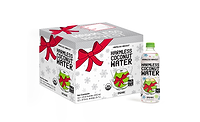Suja Life offers holistic, natural beverage solutions
Company opens new facility, adds to portfolio

When it launched five years ago, Suja Life LLC was focused on bringing organic, cold-pressed and high-pressure processed (HPP) juices to a broader consumer base. Now, the Oceanside, Calif.-based company has spread its wings to deliver the same quality and health benefits to more beverage categories through its new 200,000-square-foot facility.
“One of the things that Suja has benefited from and been lucky is we’re not just a juice company anymore,” says Jeff Church, chief executive officer of Suja Life. “We’re a holistic, natural health beverage brand with our guardrails really being organic and clean label.”
What began with its Classics line has evolved to include Elements, a line exclusively available at Whole Foods Market stores; the more mainstream Suja Juice line; Probiotic Waters; Probiotic Apple Cider Vinegar Juices; and its most recent innovation, Kombuchas.
All of these lines tap into the food-as-medicine movement that is embraced by healthy, engaged consumers, Church notes. He adds that in today’s market, a sea-level shift has taken place in which more healthy consumers are becoming engaged at an earlier age compared with previous generations.
“That whole shift is fueling this natural health beverage movement that we’re seeing,” he says.
This shift has enabled Suja Life to expand its expertise to more beverage categories that not only serve consumers but also retailers.
“For us, it helps us demonstrate to the industry that we’re a master brand, so [Suja] has the ability to move across different healthy beverage segments as opposed to being vertical in just one particular segment,” Church explains. “I think that increases the value to retailers so the retailer doesn’t have to have 10 different suppliers or 10 different products if they can align with a handful of brands that have segments of their product line that can go into those spots.”
Functional approach
As a natural healthy beverage company, Suja Life’s expansive portfolio is helping fuel better-for-you beverage trends. But true to the company’s origins, it is doing so with a creative zeal.
For example, the new Kombucha line exemplifies Suja Life’s commitment to transparency and product quality through its organic and non-GMO status, but also is boosted with functional adaptogens and 5 billion colony forming units (CFUs) of probiotics.
“I think one of the unique things that we’ve done with our kombucha is 5 billion probiotics in it, which is higher than any other kombucha line that I’m aware of, and we’re using different herbs from eastern India,” Church says. “They’re called adaptogens, and adaptogens are things that you consume in your body and it adapts to what you need. Ashwagandha is about energy, so each drink has a different adaptogen in it.”
Ashwagandha is featured in the line’s Ginger Kombucha, while the adaptogen moringa is in Green Kombucha, Peach Kombucha contains the adaptogen reishi, and adaptogenic schizandra berry is in Berry Kombucha.
“We’re trying to bring in things that we can do the Suja way and can be put into these juices,” Church explains. “What we find is consumers don’t want just one drink, they want something functional out of it now.”
The fermented tea drinks also are blended with organic cold-pressed fruits and vegetables to develop a balanced profile. This inclusion is among the attributes that helps Suja Life’s Kombucha line stand out from its competitors, Church notes.
“We’re using single-strength ingredients,” he says. “Since we’re a juice company, we don’t have to use concentrates, we don’t have to use extracts or something like that, we’re using single-strength juice. What that means is we’re getting a more holistic product than you are with concentrates and extracts and stuff like that where you don’t really know if they’ve been done at the right levels. I think that’s something that differentiates us.”
Church notes that the company’s decision to develop a kombucha actually came at the request of one of its retail partners: Costco. He said the club store chain approached Suja Life about developing the product, and that entering the sparkling drinks market with a low-sugar alternative was something Suja Life wanted to explore.
Taking a suggestion from a partner is nothing new for Suja Life. In fact, Church notes that roughly half of its new product development are a result of partner suggestions.
“[W]ith our retailers, probably 50 percent of our innovation comes from retailer-driven ideas and 50 percent comes from our own initiatives in certain areas,” he says. “I think that’s one of the unique things about Suja is we’re fortunate enough to do well because we’re able to go from idea to market as quick as eight weeks, so it’s a fast innovation cycle.”
No shortage of choices
Although the Kombucha line is the latest release from Suja Life, the company maintains its focus on new product development.
Recognizing the growing demand for products that support digestive health, Suja Life launched a line of Apple Cider Vinegar juices last year. The line was developed as more and more consumers were turning to apple cider vinegar for its health benefits, but struggled to embrace the astringent taste profile.
“Our thought was if you could blend that up with cold-pressed juice and water and make it more palatable, you could get the benefits of apple cider vinegar but [with] a better experience for the consumer,” says Greg Rose, vice president of marketing. “I think we’ve delivered on that pretty nicely.”
The lineup features 10 SKUs that blend cold-pressed juices with either apple cider vinegar or coconut vinegar.
“Coconut vinegar is a little less harsh than apple cider vinegar, a little sweeter, a little more palatable, so those perform better for us,” Rose notes.
Although the varietals that contain coconut vinegar can serve as an introduction into the Vinegar juices line, the lineup’s most popular SKU — Lemon Cayenne — is made with organic apple cider vinegar.
Bella Tumini, senior brand manager with Suja Life, highlights that the Lemon Cayenne Drinking Vinegar actually is similar to the company’s top-performer from its Classic line, Lemon Love. She adds that the flavor has become more approachable thanks to consumer trends.
“People know that from lemon and cayenne, you have the master cleanse or other functional juices that have that as a base,” Tumini says.
The Apple Cider Vinegar juices line has a number of spicy and sweet profiles and also plays to some other emerging flavor trends. Bryan Riblett, chief innovation officer and vice president of commercialization, notes that the line’s flavor profiles were developed to help make the consumption of apple cider vinegar more palatable for consumers.
“It was more about balancing the apple cider vinegar … [and] trying to present them in a way that you can enjoy something that’s beneficial for you without having to gag down the vinegar taste,” he says. “Just a play on well-rounded flavor profiles that are unique and palatable.”
In addition to the Kombucha and Apple Cider Vinegar juice lines, the company has added SKUs to its Classic line and probiotic juices to its Suja line.
“We just launched the Ginger Love … in the Classic line,” Tumini says. “In addition to that, in our Classic line, we just launched three fermented botanicals. They’re melon based. There’s a Watermelon, a Honeydew and a Cantaloupe, where we actually planted and grew our own organic melons. Each one of those flavors has a fermented botanical added to it. Watermelon has fermented lemongrass, Honeydew has fermented turmeric [and] Cantaloupe has fermented turmeric as well.”
For the Suja line, the company added three new probiotic juices following the success of Daybreak, which is a spicy maple syrup-sweetened lemonade that contains 2 billion CFUs of vegan probiotics.
“The first is Vibrant Probiotic, which is a sweet strawberry smoothie [with] lower sugar relative to the other products in the set and boosted with the benefits of probiotics,” Tumini explains. “Then we’ve got Radiant Probiotic, where we’ve had spicy lemonades and we’ve had greens, but we’ve never combined spice and greens, so this is our first lower-sugar green that has cayenne pepper in it, so it’s a spicy green with probiotics. The last one is Wild Probiotic and that one’s a spicy pink lemonade. It’s got maqui berry in it, which gives it a vibrant hot pink color and then again probiotics, and that has zero grams of sugar, so tapping into the trends of lower sugar, immunity and digestion.”
This summer, the Suja line also added Probiotic Watermelon. “We blend the fruit with the rind and it’s got lemon and lime in it and then 2 billion CFUs of probiotics,” Tumini says.
In anticipation of the holiday season, the company released Mulled Apple Cider in 46-ounce multi-serve bottles at Sam’s and Kroger stores. The seasonal beverage contains apple, orange, pineapple, carrot, honey, ginger, cinnamon, vanilla and clove.
In all, Suja Life offers approximately 87 SKUs of which 56 are unique formulas, but has launched around 250 in its tenure. “Within Suja, I think it creates excitement to be in new products,” Church says. “In the five years that we’ve been here, we’ve innovated I think 250 new products or so. We’ve killed about 200 of them so there’s about 50 we keep. … It gives us that relationship with the retailers because we have more innovation.”
That innovation is not just limited to the products that end up on store shelves. “For every flavor that we launched, there’s about five other creations that we didn’t launch,” Tumini adds.
With the approximately 250 SKUs that have been launched, it equates to 1,250 flavors created in five years.
The creative nature within new product development also has allowed Suja Life to launch one of its most successful give-back marketing campaigns.
Last fall, the company announced the limited-edition release of Midnight Tonic, a juice that combined activated charcoal, water, lemon, stevia, shizandra berry and ginger. The special-release beverage was offered for purchase to consumers and brand influencers through sujajuice.com. On the day of the announcement, the website actually crashed, Tumini says. Once it was back up and running, the product was sold out within three days, she adds.
Although the give-back program is a recognized success for the company, the Midnight Tonic release almost didn’t happen.
“We actually had pitched it to Whole Foods as a new product and was accepted globally,” Tumini says. “It was going to go into Whole Foods stores nationwide and right before it launched, we learned that it didn’t have a specific certification called GRAS, which a lot of retailers need in order to put something on shelves. Since it didn’t have that, we couldn’t go forward with launching it.
“But we had this amazing flavor that everyone in our office was obsessed with,” she continues. “… Because we couldn’t launch it in retail, we thought let’s do a give back and give all of our loyal fans and all of our organic celebrities and influencers that have been with us since the beginning, we’ll just put it out as a limited offer we’ll send it to them as a ‘Hey, thanks for all of your support over the years, here’s something cool that we’re going to do,’ and we put it up on our website for fans and consumers to purchase.”
Investing in growth
In order to develop its innovative, clean-label beverages, Suja Life relies on a steady supply chain of organic produce and its new state-of-the-art facility.
Following a 2015 investment from Atlanta-based The Coca-Cola Co. for a minority stake in the company, Suja Life was able to direct its capital expenditures toward the development of a new 200,000-square-foot facility in Oceanside, Calif.
Previously, the company had two campuses in San Diego: one that housed the produce and the other that processed it. Now everything is in one location.
“Now that everything’s all in one campus, it’s really streamlined a lot of our abilities,” Riblett says.
The facility operates 24/7 with various operations taking place, including processing, bottling, HPP and sanitation, he adds. HPP operations take place five days a week across three shifts.
“We have just over 50 different SKUs, and we run that every week,” Riblett explains. “It’s fresh product, so that’s been a challenge but one of the heroes to our products is we make everything to order, so every week we’re making all 50 SKUs and on average it’s close to around 1 million bottles a week. It’s a lot of produce.”
Each week, Suja Life receives more than 1 million pounds of fresh organic produce.
“We acquired our produce purveyor early on as we started growing,” Riblett explains. “We soon became their largest client and kind of just brought them in house. Along with that partnership, their family is a long lineage of farmers, so they actually had direct connections with the farms. It was convenient and made sense for us as [a] large organic produce company starting out as we started scaling and growing.”
All of the farms that supply the produce are located within 400 miles of Suja Life’s facility. The company uses collapsible bins to transport the majority of the produce that comes into the facility. This allows it to minimize one-time-use containers and furthers the company’s sustainability goals.
After the produce is gently ground, it goes through a press to extract the juice. With the capital investment in the facility, Suja Life also acquired a new press, which has increased its extraction capabilities based on a per pound basis of produce by 10 percent, the company says.
The company has three filling lines to handle the 50 SKUs that Suja Life produces. Because of the vast amount of products it’s filling, the company executes between 10 and 15 changeovers a day. All of these are monitored to ensure proper clean-in-place procedures are followed and the products are kept at 40 degrees Fahrenheit or below.
Because the HPP machines operate slower than the filling lines, collection barrels are utilized to place the bottled juices into the tubs sent into the HPP machine where they undergo approximately 87,000 PSI of pressure. In all, Suja Life processes and bottles from 750,000 to 1 million packages a week.
The pallets of packaged product are then placed in the storage section of the facility, which is cooled to 33 degrees Fahrenheit. The company utilizes high-density storage racking that goes three deep to support a first-in, first-out operation.
The storage section typically accounts for a supply of 10 days because products basically are produced on a ready-to-order timetable.
“We don’t make to inventory, so we’re constantly shipping as we make products so sometimes we get orders in on Wednesdays and we basically request what produce needs to be brought in,” Riblett says. “It’s brought in on Thursday through Saturday, then what was pulled from the field that Thursday will be put into a bottle by Sunday and shipped out that same week, so it’s really a pretty quick turnaround.” BI
A mutually beneficial partnership
Three years into Oceanside, Calif.-based Suja Life’s tenure, the organic, cold-pressed juice brand saw its goal of bringing its natural and holistic beverages to the masses come closer to becoming a reality. Following a $90 million investment from Atlanta-based The Coca-Cola Co. for a minority stake in 2015, Suja Life has been able to utilize The Coca-Cola Co.’s expertise for various aspects of its business while also providing value to The Coca-Cola Co.
“We gained a whole bunch of benefits through their assistance, one of which is distribution,” says Jeff Church, chief executive officer of Suja Life LLC. “We continue to sell where we can through the Odwalla distribution system and that’s good for them, [and it’s] good for us because they get to package some of their products with our products, so we increase the utilization on the trucks. That’s been a positive.
“They’ve helped us reduce our bottle costs from a packaging standpoint and that’s been a real benefit of working with them,” he continues. “They’ve helped us secure a relationship with their data providers that provide us with really good, meaningful category data. That’s been a benefit from them, and then their knowledge and wisdom of what we do and they’ve been there, seen it and done it, and we’re on the learning side of it, so that’s been really positive.”
Church is thankful for the benefits that Suja Life has realized from The Coca-Cola Co., but also is happy that the entrepreneurial company has been able to do the same for the established corporation.
“I think we’ve helped Coke, too,” he says. “When I think of the areas where we’ve added value for Coke is we’ve been able to take a Zico product, for example, from idea to market in as quick as five months, four months, which, for them, is really fast. That collaboration is the type that they want to get out of our brands because venturing and emerging brands are typically going to be more entrepreneurial, a little faster to market, can have a little of a cult following and [when you] integrate those into bigger businesses, you get lost, and Coke has done a really great job.”
Going forward, Church says that Suja Life and The Coca-Cola Co. have more collaborations in the works.
“Using our capability of [high-pressure processing (HPP) and what can we do in the Coke organization,” he says. “We’re in the process of developing products with Zico called Coco Elixirs. They’re roughly half coconut juice and half cold-pressed juice under the Zico name, so it gives the Zico consumer an opportunity to come into the cold-pressed juice space, so more of that we can do with other aspects within Coca-Cola.”
Looking for a reprint of this article?
From high-res PDFs to custom plaques, order your copy today!






